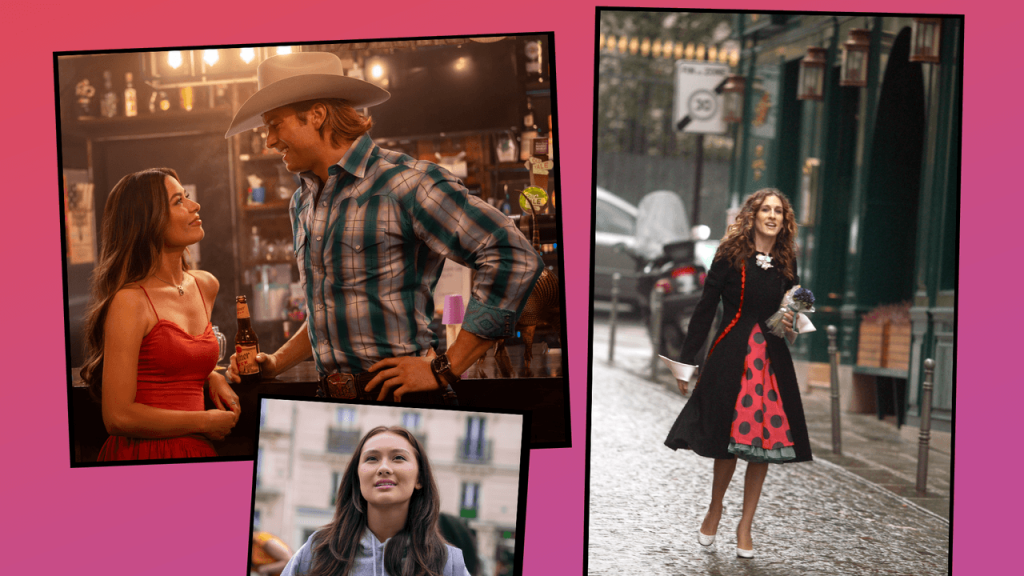Stop me if you’ve heard this one before: Boy meets girl, girl seeks adventure in Paris, then girl’s complicated feelings for said boy ultimately taint her ability to actually enjoy the city of love. That scenario factors into the plot of both The Summer I Turned Pretty’s final season and the newly released Netflix rom-com The Wrong Paris—although this time, our heroines, played by Lola Tung and Miranda Cosgrove respectively, make it to Paris—and get to stay, at least for a while.
On The Summer I Turned Pretty, Belly defers her acceptance to study abroad in Paris for premature marriage with Jeremiah (Gavin Casalegno). She then comes to her senses, calling off the wedding and moving overseas, where she fights through homesickness and language barriers to build a nice little life for herself. Of course, that independence will soon be interrupted by Belly’s ex Conrad (Christopher Briney), seen buying a plane ticket to Paris in the show’s penultimate episode. But at least she was given the opportunity to test out both versions of her future before making a choice.
That’s also true of The Wrong Paris, a silly rom-com about a Bachelor-esque reality dating show that contestants are led to believe will be filmed in Paris, France, only to learn it’s actually Paris, Texas—population 25,000. Our heroine, Cosgrove’s Dawn, takes the twist in stride, vowing to compete on the show—not for love, but some prize money to fund studying at a Paris art school. “I don’t hate this,” she says of her hometown, “I just hate that this is the only thing I’ve ever known.” Then a cowboy named Trey (Pierson Fode—also, has anyone ever actually met a cowboy named Trey?) and his comically sculpted abs waltz in. “You ain’t gonna find no man like me in Paris,” he drawls, to which she replies: “Yeah, that’s the point.” Surprise, surprise, Dawn and Trey do fall in love and later strike a bicontinental compromise—she’ll finish school, then presumably come back to Texas.
Hepburn and Astaire, near 30 years in age between them, leave Paris as husband-and-wife in Funny Face.LMPC/Getty Images
Paris has long been a place for lovers onscreen. Casablanca (1942) famously ends with Humphrey Bogart’s Rick telling Ingrid Bergman’s Ilsa that they’ll always have their time in Paris, even if they can’t end up together. The European city has gotten in the way of a whole lot of love affairs ever since. Perhaps no one was more familiar with this than poor Audrey Hepburn, who starred in six films set in the City of Light throughout the 1950s and ’60s, most of which end with the idea that her lovelorn character would presumably rather return to the United States with a man twice her age than walk along the Seine solo. (Case in point: Hepburn choosing Bogart in 1954’s Sabrina—a frequent reference on The Summer I Turned Pretty, and then Fred Astaire in 1957’s Funny Face—which has been repeatedly mentioned on Netflix’s Emily in Paris.)
Somewhere along the way, Paris became the go-to plot device standing in between a single woman and her love interest. The city represented female independence and agency—a culturally rich alternative to the happily ever after established in fairy tales.
On ’90s to early aughts TV, Paris became a surefire tactic for injecting drama into long-running “will they or won’t they?” couples. Shannen Doherty’s Brenda flees her dramatic on-again-off-again dynamic with Luke Perry’s Dylan on Beverly Hills, 90210 for a summer study-abroad program. Sarah Jessica Parker’s beret-clad Carrie Bradshaw now famously hurls a McDonald’s “le Big Mac” upon learning that “Big is moving to Paris,” in Sex and the City season two. Then her own Parisian journey with Frenchman Aleksandr Petrovsky (Mikhail Baryshnikov) is cut short in the series finale once Big (Chris Noth) shows up to bring her back home. On another hotly anticipated final episode, Jennifer Aniston’s Rachel Green considers moving overseas with her toddler-aged daughter for a fresh start working at Louis Vuitton after years of across-the-hall pining for David Schwimmer’s Ross. But these flights of fancy don’t last long—a brief layover on the way to domesticated bliss right back where they started.


